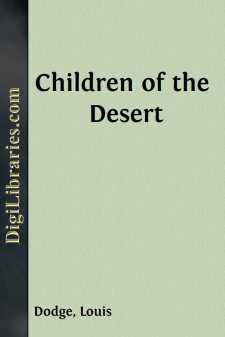Categories
- Antiques & Collectibles 13
- Architecture 36
- Art 48
- Bibles 22
- Biography & Autobiography 813
- Body, Mind & Spirit 142
- Business & Economics 28
- Children's Books 15
- Children's Fiction 12
- Computers 4
- Cooking 94
- Crafts & Hobbies 4
- Drama 346
- Education 46
- Family & Relationships 57
- Fiction 11828
- Games 19
- Gardening 17
- Health & Fitness 34
- History 1377
- House & Home 1
- Humor 147
- Juvenile Fiction 1873
- Juvenile Nonfiction 202
- Language Arts & Disciplines 88
- Law 16
- Literary Collections 686
- Literary Criticism 179
- Mathematics 13
- Medical 41
- Music 40
- Nature 179
- Non-Classifiable 1768
- Performing Arts 7
- Periodicals 1453
- Philosophy 64
- Photography 2
- Poetry 896
- Political Science 203
- Psychology 42
- Reference 154
- Religion 513
- Science 126
- Self-Help 84
- Social Science 81
- Sports & Recreation 34
- Study Aids 3
- Technology & Engineering 59
- Transportation 23
- Travel 463
- True Crime 29
Children of the Desert
by: Louis Dodge
Categories:
Description:
Excerpt
CHAPTER I
They were married in the little Episcopal church in Eagle Pass on a September day in the late eighties. The fact may be verified, I have no doubt, by any who will take the trouble to examine the records, for the toy-like place of worship still stands.
The church structure is not, perhaps, so small as my imagination presents it to me; but I cannot see it save with the desert as a background—the desert austere and illimitable. You reach the prim little front door by climbing a street which runs parallel with the Rio Grande, and the church is almost the last structure you will pass before you set forth into a No-Man’s land of sage and cactus and yucca and mesquite lying under the blazing sun.
Harboro his name was. Of course, there was a Christian name, but he was known simply as Harboro from Piedras Negras to the City. She was Sylvia Little. Sylvia, people called her, both before and after her marriage. The Little might as well never have belonged to her.
Although neither Harboro nor Sylvia really belonged to Eagle Pass, the wedding was an event. Both had become familiar figures in the life of the town and were pretty well known. Their wedding drew a large and interested audience. (I think the theatrical phrase is justified, as perhaps will be seen.) Weddings were not common in the little border town, unless you counted the mating of young Mexicans, who were always made one by the priest in the adobe church closer to the river. Entertainment of any kind was scarce. But there were other and more significant reasons why people wanted to see the bride and the bridegroom, when Harboro gave his name to the woman of his choice.
The young people belonging to some sort of church guild had decorated the church, and special music had been prepared. And indeed when Harboro and Sylvia marched up the aisle to the strains of the Lohengrin march (the bridegroom characteristically trying to keep step, and Sylvia ignoring the music entirely), it was not much to be wondered at that people craned their necks to get the best possible view. For both Harboro and the woman were in a way extraordinary individuals.
Harboro was forty, and seemed in certain aspects older than that. He was a big man, well built, and handsome after a fashion. He was swarthy, with dark eyes which seemed to meditate, if not to dream. His hair was raven-black, and he wore a heavy mustache which stopped just short of being unduly conspicuous. It was said of him that he talked little, but that he listened keenly. By trade he was a railroad man.
He had been heard to remark on one occasion that he had begun as a brakeman, but there were rumors of adventurous days before he became a member of a train crew. It was said that he had gone prospecting into Mexico as a youth, and that he had spent years working at ends and odds of jobs about mines and smelters. Probably he had hoped to get into something in a big way.
However, he had finally turned to railroading, and in the course of uncertain events had become an engineer....



